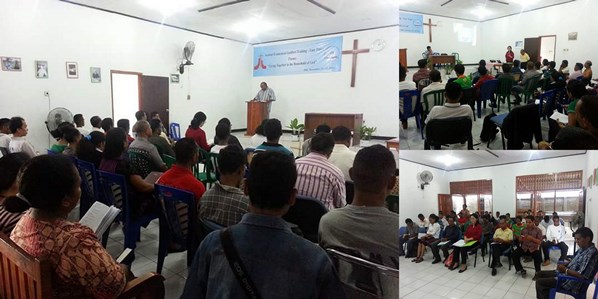Ecumenical Enablers Training At Timor Leste
 2015 Ecumenical Enablers Training
2015 Ecumenical Enablers Training
IPTL Synod Centre, Dili, Timor Leste
16-19 November 2015
“Living Together in the Household of God”
The Ecumenical Enablers Training (EET) is a non-formal ecumenical education program designed for church leaders, pastors and lay leaders at the grassroots. This special program promotes a wider sense of ecumenism among such pastors and church leaders from CCA member churches and councils and reinforces the ecumenical vision and mission of living together in unity and in common witness to God’s love through transforming mission. Its objectives include training of church leaders, pastors and youth to build a strong national network of churches and to help them play a meaningful role in the ecumenical movement in Asia.
Recognizing the importance of ecumenical formation and capacity enhancement of church leaders, this non-formal ecumenical education program has been an ongoing program for many years. It addresses the needs of CCA member churches and councils in countries where there are not many people who have ecumenical theological education because there is a lack of such colleges or institutions in these countries, and have less awareness and exposure to contemporary issues and realities.
The first EET in Timor Leste was held in 2012, which was widely appreciated and welcomed by local church leaders. Encouraged by the responses and the impact of the first training, CCA is conducting its second program in Timor L’este from 16 -19 November 2015 Monday, in cooperation with the Protestant Church in East Timor. 45 participants are attending this training that is being held at IPTL Synod Centre in Dili. The training is facilitated by Rev. Fredrick Doeka, from GMIT, Indonesia; Rev. Francisco de Vasconcilos and Rev. Moises Silva from IPTL; and Rev. Grace Moon from CCA.
Based on the theme of the 14th General Assembly of the CCA, “Living Together in the household of God,” the participants will be assisted in understanding Asian realities within the local, regional and global context and God’s call for churches in Asia to respond in the light of the values of love, justice and peace that Christ taught. Bible studies, Thematic lectures, case studies and group discussions will cover a wide range of topics that will educate them on ecumenism and Asian ecumenism and the CCA as a regional ecumenical organisation; encourage them to appreciate the wisdom of moving beyond the boundaries of the church to embrace people of other denominations, faiths, traditions and cultures; and make them realize that living together in respect and harmony with all people, especially with people of other faiths, is the corner stone of a peaceful and just world. The participants are also encouraged to take seriously the responsible role of the churches in prophetic witness and diakonia wherever injustice and conflict exists. Nurturing the younger generation, women’s leadership and multicultural education form an integral part of the EET curriculum.
The training will end with a reflection on how IPTL will take up their role in prophetic witnessing and advocacy; how they plan to strengthen their community in theological and spiritual thinking; and how they will engage in promoting ecumenism and serve the community in the light of all that was taught and discussed.










